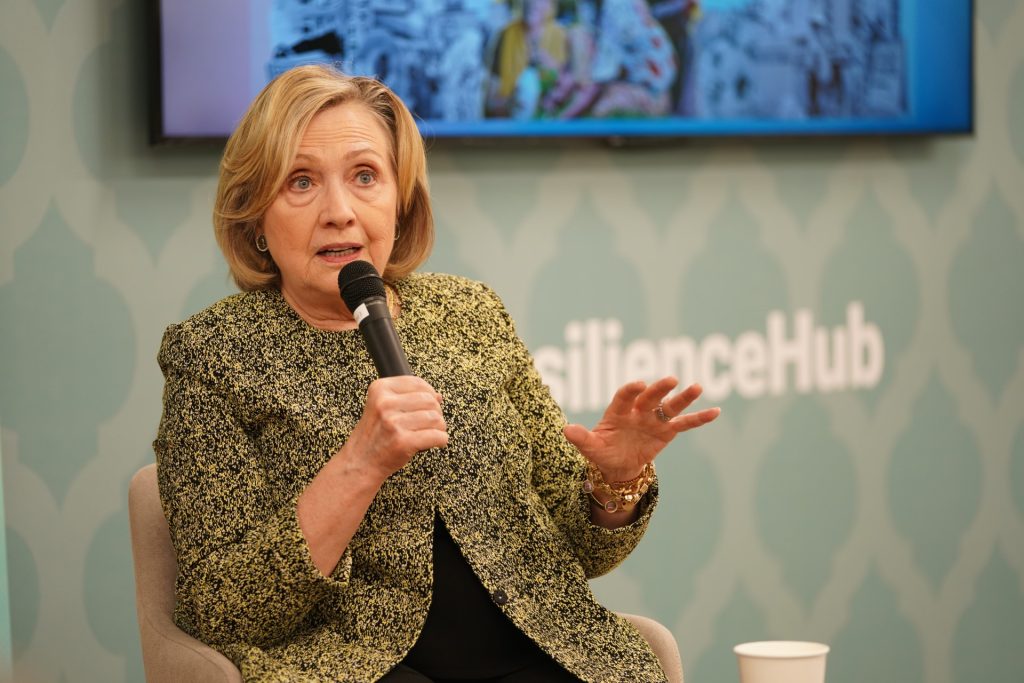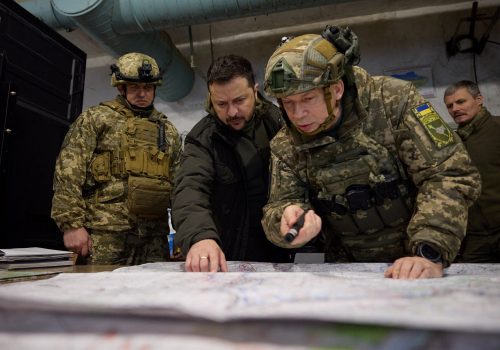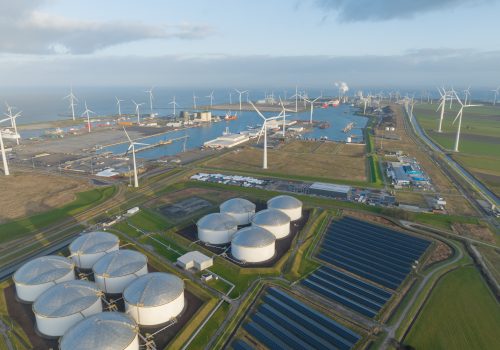Where former US Secretary of State Hillary Rodham Clinton goes in Dubai this week, she draws a crowd.
People from all corners of the world packed the room, and it was standing room only at our COP28 Resilience Hub, where she held court as the Atlantic Council’s Adrienne Arsht-Rockefeller Foundation Resilience Center (Arsht-Rock) ambassador for heat, health, and gender.
“Extreme heat has to be viewed as one of the most dangerous results of the changing climate,” she said, recounting a trip to India, where she saw the harm done to livelihoods, particularly those of women working outdoors as farmers, street vendors, waste collectors, and salt pan and construction workers. “This is not just a health issue,” Clinton warned. “It’s an economic issue, a social issue, [and] a political issue.”
Working with Clinton and with Reema Nanavaty, director of the nearly three-million-member Self-Employed Women’s Association, the Atlantic Council has been implementing a parametric insurance program as a part of Arsht-Rock’s Extreme Heat Protection Initiative. This program protects women working in India’s informal sector from having to make an impossible choice: pausing their work during heat waves (to protect their health) or continuing to work and earn money, while putting their wellbeing at risk.
What has been winning the headlines here so far at this twenty-eighth United Nations Climate Change Conference has been the announcement on the first day of a landmark, $400-milllion loss and damage fund, a mechanism that provides financial assistance to the countries most affected by, but often least responsible for, the climate crisis. There has also been media attention on the hydrocarbon companies that have come to this conference in greater numbers than ever before—many with concrete commitments and plans to reduce emissions.
With over seventy thousand delegates and observers at COP28, actions that aim to improve lives—such as insurance programs to support workers in the informal economy, many of them women—deserve notice. For these workers especially, “their lives and livelihoods are at stake,” said Eleni Myrivili, the global chief heat officer for United Nations-Habitat and Arsht-Rock.
Frederick Kempe is president and chief executive officer of the Atlantic Council. You can follow him on Twitter @FredKempe.
This edition is part of Frederick Kempe’s Inflection Points Today newsletter, a column of quick-hit insights on a world in transition. To receive this newsletter throughout the week, sign up here.
Further reading
Sun, Dec 3, 2023
Hillary Clinton, Reema Nanavaty, and Eleni Myrivili on gender-responsive solutions for extreme heat
New Atlanticist By Daniel Hojnacki
At an Atlantic Council event at COP28, the former US secretary of state discussed the importance of empowering women to develop innovations for extreme heat resilience.
Fri, Dec 1, 2023
Don’t stop now. US aid to Ukraine continues to be a wise investment.
New Atlanticist By Michael John Williams
Cutting off aid to Ukraine now, as some in Congress propose, would undermine the immediate war effort in Europe and diminish the deterrent power of US military force globally.
Thu, Nov 30, 2023
The 2024 Global Energy Agenda
Global Energy Agenda By
The fourth edition of the Global Energy Agenda kicks off with a collection of essays by energy leaders that are rolling out during COP28. Rounding out the Agenda in early 2024, the Atlantic Council Global Energy Center will release the results of its annual survey of experts that takes the pulse on the geopolitical risks affecting energy markets, the future of fossil fuels, and the transition to clean energy.



